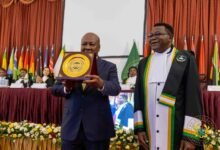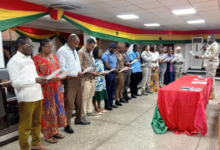
The Minister of State at the Ministry of Finance, Abena Osei-Asare, says the government remains committed to enhancing tax compliance and reducing inefficiencies in the country’s tax system.
The move, the minister said, would be in tandem with the Medium-Term Revenue Strategy outlined by the ministry.

“We have a Medium-Term Revenue strategy and the Medium-Term Revenue strategy is on our website so clearly you can see where the government is charting. The most important thing is this…how do we raise the needed revenue? Wherever it is going to come from, how do we raise the needed revenue? That should be the main agenda and if we are going to improve the VAT collection to raise more revenue, we will do that,” Ms Osei-Asare said.
The minister, who disclosed this following reports, suggesting that the government might reintroduce 15 per cent VAT on electricity should disinflation trends persist, at the opening of the 12th Annual International Tax Conference in Accra, yesterday.
The two-day conference was organised by the Chartered Institute of Taxation Ghana (CITG), on the theme: ‘Balancing Tax Policy and Private Sector Development,’ to create a platform for advancing knowledge, fostering collaboration and shaping the future of taxation and revenue mobilisation.
It was attended by both local and international participants, including government officials, policy makers, chief executive officers, finance directors, academia, tax practitioners, tax administrators, business executives, among others.
Ms Osei-Asare explained that government’s effort to enhancing tax compliance and reducing inefficiencies would focus on improving the collection of Value Added tax (VAT) and excise duties, among other revenue measures.
That, she stated, would increase the country’s tax revenue for economic development.
“So if we are going to improve the excise duty collections to make us raise more revenue, we will do that without necessarily having to increase those taxes. But, we are going more on compliance and reducing inefficiencies because we believe there is so much to be done and once it is done without necessarily increasing taxes, we can rake in more revenue,” Ms Osei-Asare added.
The Commissioner-General of Ghana Revenue Authority (GRA), Ms Julie Essiam, stressed the need for tax policies to be flexible to grow and optimise tax revenues in tandem with private sector development.
The policies, she said, must be simple and easy to understand by everyone and should focus on the certification of tax scandals.
“For example, we must work towards having a simple rate for Value Added Tax and avoid the perceived cascading effect of the monstrosity of rates under the current regime,” she noted.
The President of the CITG, Mr George Ohene Kwatia, advocated prioritising capacity building initiatives for tax practitioners, leveraging technology to streamline tax administration, addressing legislative inconsistencies for a coherent tax framework, while fostering strong collaborations between GRA, CITG and other stakeholders.
“Enhancing the quality of tax returns and promoting a culture of compliance will also be beneficial,” he indicated
BY VIVIAN ARTHUR







